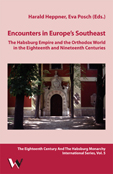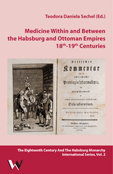Zu diesem Buch

This book provides a broad overview of the political, economic and cultural aspects which shaped medicine in the two empires (the Habsburg and Ottoman) that controlled Central
and South-eastern Europe in the eighteenth and long nineteenth centuries. Drawing exclusively on the wide range of sources hitherto largely used by physicians who became
researchers on the history of medicine, it illustrates the connection between local knowledge and central networks, between religion, science and trade. Besides, the volume
shows that military considerations determined the development and introduction of preventive health measures.
Although thematically, geographically and chronologically diverse, each chapter presents original and innovative research in the social and cultural field of medical humanities. The
book provides information to the wider academic community which was mainly rendered in Central and South-eastern European languages. These languages include Romanian,
Bulgarian, Polish, Turkish and German; languages which are not easily accessible to Western researchers on the history of medicine.

Das Buch gibt einen Überblick über politische, wirtschaftliche und kulturelle Aspekte, die die Medizin im habsburgischen wie im osmanischen Reich im 18. und langen
19. Jh. beeinflussten. Mit dem Fokus auf den reichhaltigen Quellen, die hauptsächlich von Ärzten, die zu Medizinhistorikern wurden, ausgewertet wurden, zeigt der
vorliegende Band die Wechselwirkungen zwischen lokalem Wissen und zentralen Netzwerken, zwischen Religion, Naturwissenschaft und Handel auf. Ebenso kommt der Einfluss
militärischer Überlegungen auf die Entwicklung und Einführung von vorbeugenden Gesundheitsmaßnahmen zur Sprache.
Auch wenn die einzelnen Kapitel thematisch, geographisch und zeitlich ein großes Spektrum abdecken, so präsentiert jedes doch originelle und innovative
Untersuchungen im sozialen und kulturellen Umfeld der ärztlichen Praxis. Die Beiträge stützen sich dabei hauptsächlich auf Quellen in den zentral- und
südosteuropäischen Sprachen, die westlichen Medizinhistorikern oft nicht zugänglich sind.
Contents
Acknowledgements
Karl Vocelka
Introduction
Chapter I: Intersecting Empires: Transferring knowledge
Steven A. King
Mr Killingan's Empire: A Medical Man in Habsburg Lands
Georgeta Nazarska
The Vienna School of Medicine and Bulgarian Medicine and Health Care (the 1840s-1910s): Transfer of Knowledge
Chapter II: Epidemics and Preventive Measures
Teodora Daniela Sechel
Contagion Theories in the Habsburg Empire (1770-1830)
Christian Promitzer
Stimulating the Hidden Dispositions of South-eastern Europe – the Plague in the Russo-Turkish War of 1828-29 and the Introduction of Quarantine on the Lower Danube
Octavian Buda
Black Death at the Outskirts of the Ottoman and Habsburg Empire: The Epidemics in the Phanariot Bucharest (1711 -1821)
Chapter III: Interpreting Medicine: Practicing Health
Sylwia Kuzma-Markowska
From ,Drop of Milk' to Schools for Mothers – Infant Care and Visions of Medical Motherhood in the Early Twentieth Century Polish Part of the Habsburg Empire'
Gülhan Balshoy
Admonitions to Pregnant Women: Advice Books for Expectant Mothers and the Medicalization of Pregnancy in the Late Nineteenth Century Ottoman Society
Chapter IV: Medicine and War
Silviu Hariton
Military Medicine and Conscription in Romania, 1860s-1900s
Brigitte Fuchs
Austro-Hungarian Public Health Policies in Occupied Serbia and Montenegro 1915-1918
Tamara Scheer
The Organisation of the ,Health Front': Austro-Hungarian Occupation Regimes in the Balkans (1915-1918)
Marius Turda, Steven A. King
Journeying Across Empires: An Agenda for Future Research in Central and Southeastern European History of Medicine
Abstrachts
Authors
Index



